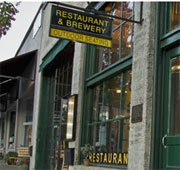 Waste, unfortunately, is inevitable in a restaurant. Leftover food is thrown out, packaging is tossed, even water glasses and silverware occasionally get thrown away. But a few simple steps towards reducing waste and energy usage can put a well-meaning restaurant on the track to sustainability. Alex Amarotico, owner of Standing Stone Brewing Company in Ashland, Oregon, understands what it takes to be a green business, and he knows why green business is so important. After all, Standing Stone was recently named #28 out of the 100 greenest businesses in Oregon—the “greenest” company in southern Oregon, according to Oregon Business.
Waste, unfortunately, is inevitable in a restaurant. Leftover food is thrown out, packaging is tossed, even water glasses and silverware occasionally get thrown away. But a few simple steps towards reducing waste and energy usage can put a well-meaning restaurant on the track to sustainability. Alex Amarotico, owner of Standing Stone Brewing Company in Ashland, Oregon, understands what it takes to be a green business, and he knows why green business is so important. After all, Standing Stone was recently named #28 out of the 100 greenest businesses in Oregon—the “greenest” company in southern Oregon, according to Oregon Business.
Standing Stone’s sustainability efforts have been applauded by numerous organizations, including the Oregon Department of Energy. In Oregon, a state that prides itself on being at the forefront of the green movement, Standing Stone has stood out as a leader in restaurant energy and waste conservation.
Standing Stone and owner Amarotico are committed to providing the best locally farmed and produced food. Amarotico hired chef Eric Bell, a dedicated localvore, in May 2009. Together they have devised a specials list that changes daily to reflect the seasonal offerings of local farmers and producers, with items on the specials list always outselling the standard menu offerings.
“Customers had a hard time at first understanding why they couldn’t have tomatoes on their burgers,” explains Amarotico, “but unless it’s tomato season, tomatoes are off the menu.”
The brewery also seeks out innovative product packaging and disposal methods. Wine, for example, is usually delivered by the case to a bar or restaurant—a large case full of cardboard and glass bottles, most of which gets thrown out. Standing Stone has moved to serving Wooldridge Creek Wine straight from the keg, eliminating much of the waste associated with serving wine. The wine is pressurized, which doesn’t cause carbonation and allows it to be served from taps, like keg beer.
The beer brewed at Standing Stone is also a model of sustainability. Most of the grains used in brewing the eight beers on tap are organic. The spent grains are then used by a local farmer for chicken and cattle feed, according to the brewery’s website.
Standing Stone’s commitment to sustainability extends beyond what’s being served for dinner. Amarotico recently ordered 14 Kona bicycles to be given for free to staff members who make a commitment to bike to work 45 days or more in a year. In addition to reducing air pollution, the free bikes raise employee morale and further promote Standing Stone’s image as an eco-friendly business.
In the future, Amarotico hopes to lease 100 acres in the surrounding valley to raise livestock and grow vegetables to serve at Standing Stone. Hops would also be grown for the brewery’s collection of eight beers. A particular plot of land that interests him was formerly sheep grazing land that has been stripped to pure clay.
“Along with growing some of our produce right down the street, we’d also restore this bit of land that has been ignored for too long,” he explains.
While being a sustainable food service business is near and dear to Amarotico’s heart, it also makes business sense. Besides promoting goodwill and increasing customer loyalty, being energy efficient, less wasteful, and conscious of food selections makes economic sense as well. Even in a challenging economy, many restaurants are ready to explore methods for trimming costs and reducing their environmental footprint.
~Erin Martin, MustHaveMenus.com
